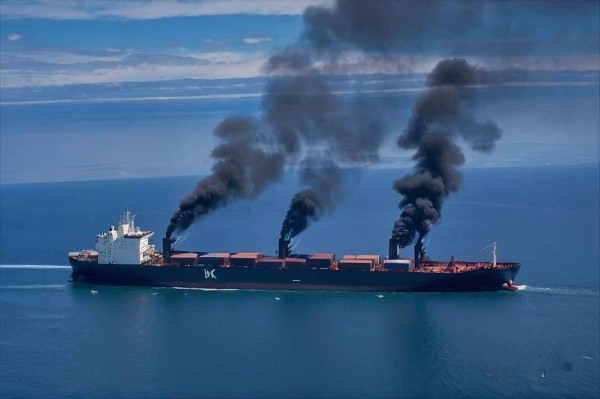Iran’s Plan to Strike Back Against the U.S.
Iran’s Military Preparations Following U.S. Attacks
Loading...

The video appears to show a series of explosions on the surface of the vessel, amid fears of a major oil spill.
Overview of the Incident
In a troubling development, Yemen's Houthi rebels have released a video that appears to show their fighters boarding the Greek-flagged oil tanker, Sounion, and detonating explosives on the vessel. This incident, which occurred earlier this month, has raised significant concerns about a potential environmental disaster due to the tanker carrying nearly one million barrels of crude oil. The footage, made public on Thursday, depicts a series of explosions on the ship's surface, intensifying fears of a major oil spill that could devastate marine life and disrupt navigation in the Red Sea.
Context of the Attack
Houthi military spokesperson Yahya Saree stated that the Sounion was targeted because it belonged to a company that had allegedly violated the group's blockade against Israel-bound vessels in the Red Sea. The Houthis have been increasingly aggressive in their operations, claiming to target ships linked to Israel as part of their broader strategy to pressure the Israeli government to cease its military actions in Gaza, which have resulted in significant civilian casualties.
The Sounion was reportedly attacked on August 21, and its crew was evacuated the same day. The vessel has since been left adrift, raising alarms about its potential to leak oil into the surrounding waters. The European Union's military mission in the Red Sea confirmed that multiple fires had been detected on the ship, although they noted that there had been no oil spill reported as of Thursday.
Environmental Concerns
The potential for an oil spill from the Sounion poses a serious threat not only to the marine ecosystem but also to global shipping routes. The Red Sea is a critical maritime corridor, and any contamination could have far-reaching implications. The EU mission, known as Operation Aspides, emphasized the importance of safeguarding this unique marine environment, which is now under threat from possible pollution.
The U.S. military has also been closely monitoring the situation, with Pentagon spokesperson Patrick Ryder indicating that the tanker appeared to be leaking oil. Efforts to salvage the vessel have been complicated by the Houthis' aggressive stance, as they reportedly warned away third-party salvage attempts.
Houthi Justifications and Regional Tensions
Houthi spokesperson Mohammed Abdulsalam defended the group's actions, asserting that the targeting of the Sounion reflects their commitment to enforcing their blockade against Israel-linked ships. He claimed that the Houthis had communicated with international parties to facilitate the vessel's removal, indicating a willingness to engage diplomatically despite their militant actions.
This incident is part of a broader pattern of Houthi attacks on maritime vessels, particularly those perceived to have ties to Israel or Western nations. The group has previously targeted other ships in the region, escalating tensions amid ongoing conflicts in the Middle East. The recent escalation follows Israeli airstrikes on Yemen's port city of Hodeidah, which resulted in civilian casualties and further inflamed hostilities.
Conclusion
The release of the footage showing the attack on the Sounion underscores the volatile situation in the Red Sea and the potential for significant environmental and geopolitical repercussions. As international stakeholders grapple with the implications of this incident, the need for a coordinated response to prevent an ecological disaster becomes increasingly urgent. The ongoing conflict in the region continues to pose challenges not only to local populations but also to global maritime security.
Editor
Iran’s Military Preparations Following U.S. Attacks
Troops remain in five strategic locations, raising fears of renewed tensions and long-term occupation.
Opposition forces have taken control of the capital after a significant offensive. Here is how it unravelled.
